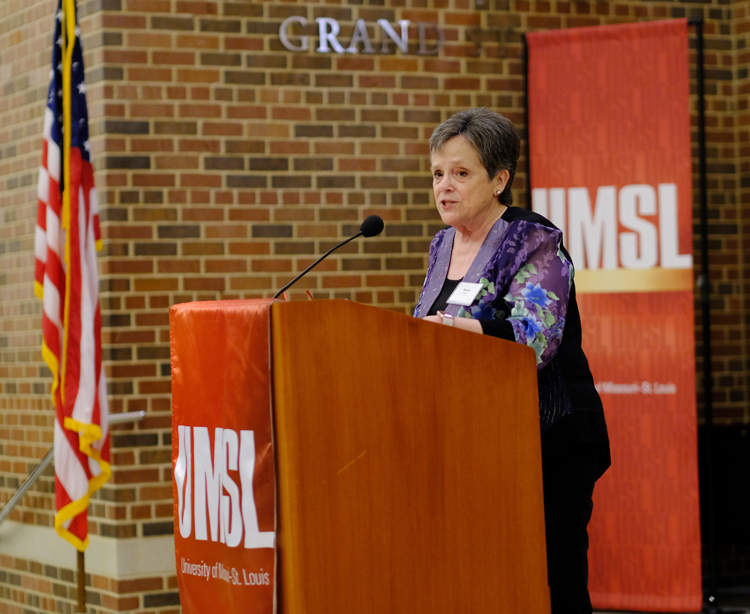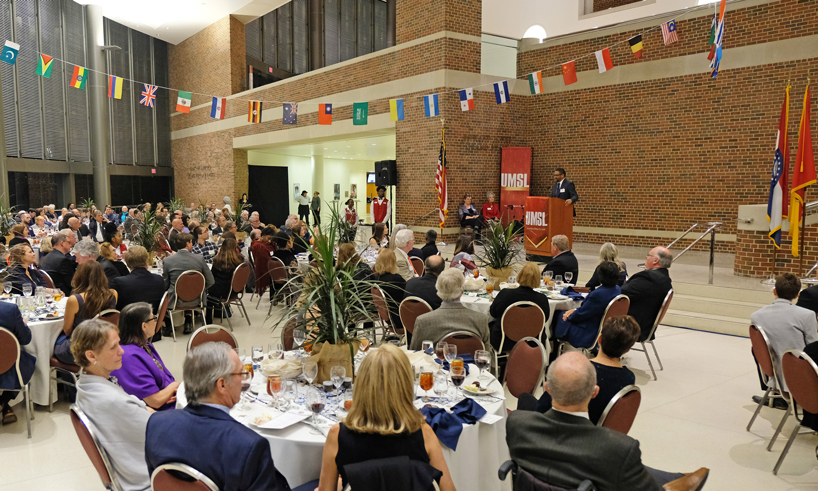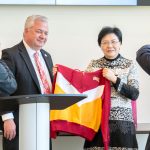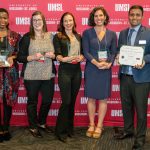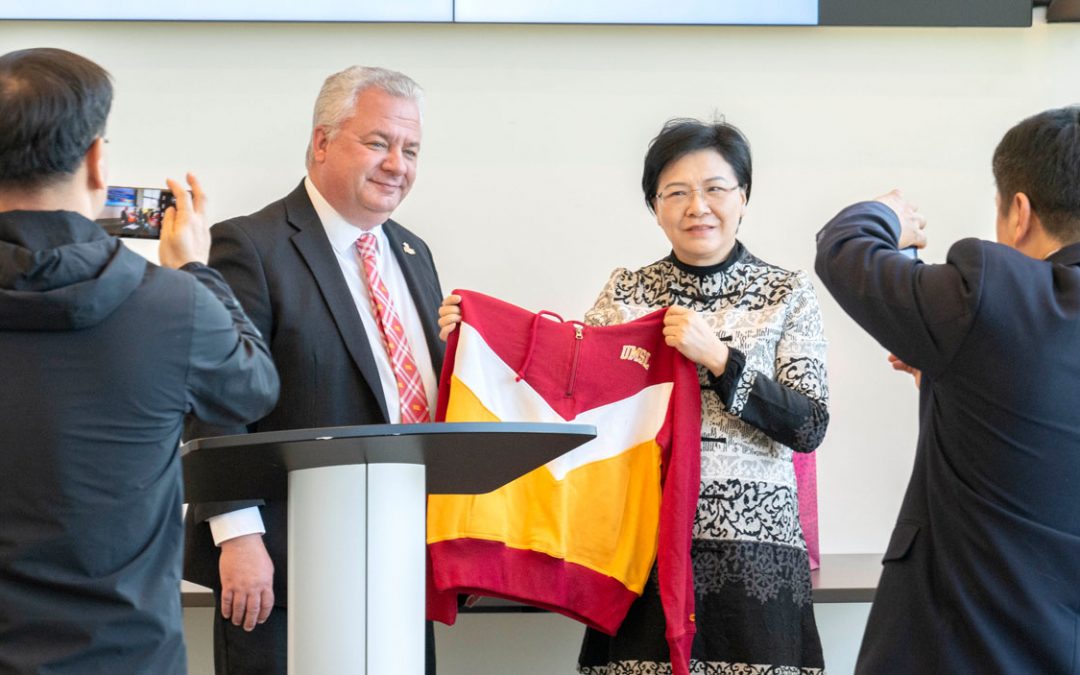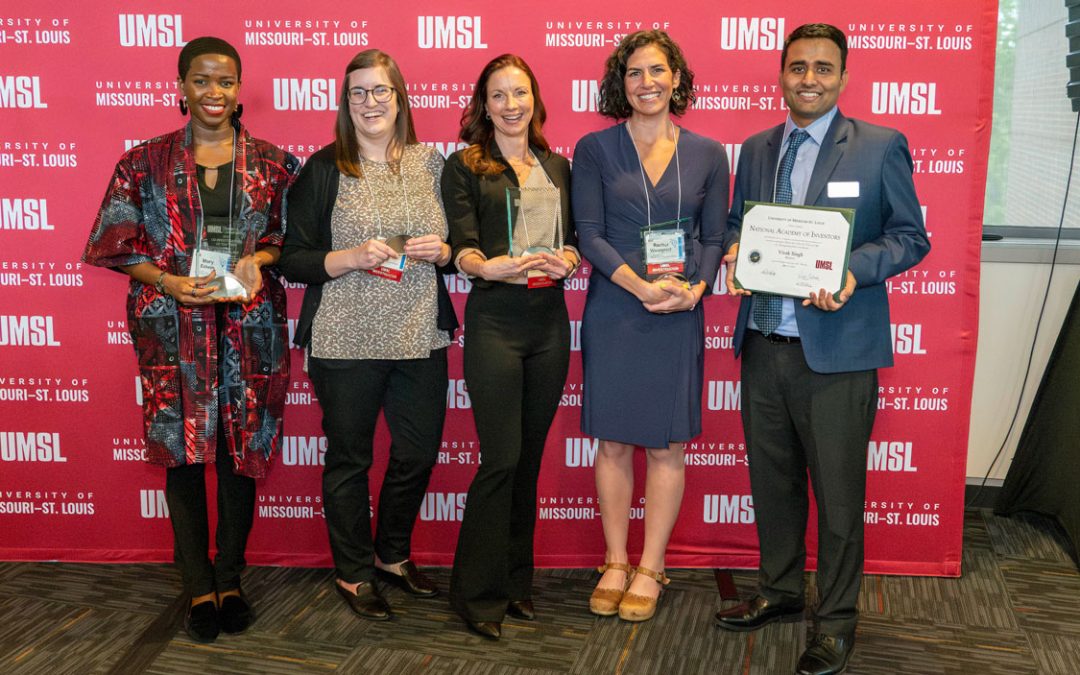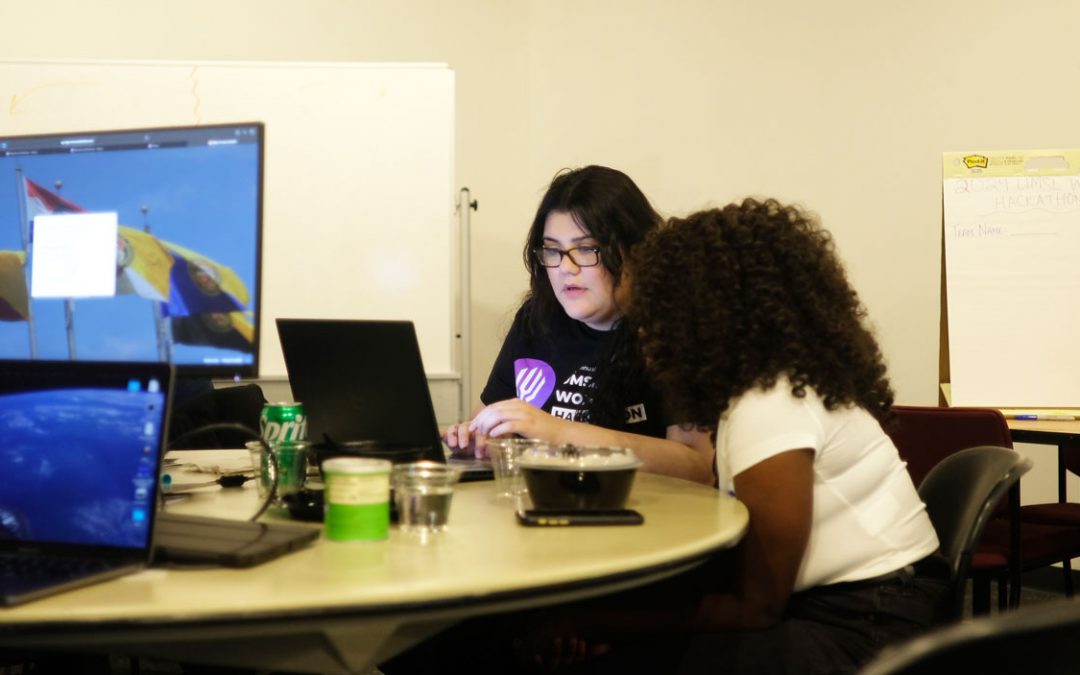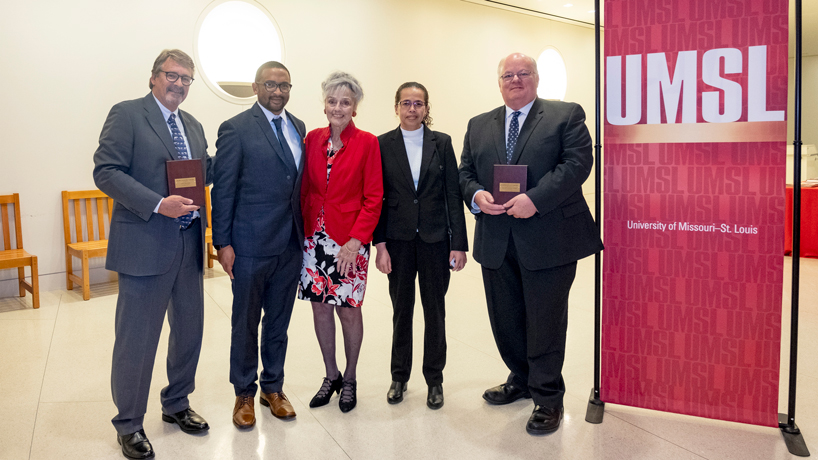
Saint Louis Zoo President and CEO Jeffrey Bonner, UMSL biology PhD Fidisoa Rasambainarivo, Anna Harris, UMSL biology PhD Cynthia Hong-Wa and Missouri Botanical Garden President Peter Wyse Jackson gathered at the conclusion of Friday night’s 23rd World Ecology Award Gala at the Blanche M. Touhill Performing Arts Center. Bonner and Jackson accepted the award from Harris on behalf of their respective organizations for their work in Madagascar. Rasambainarivo and Hong-Wa, both natives of Madagascar, discussed the impact of that work in front of an audience of more than 200. (Photos by August Jennewein)
The Missouri Botanical Garden and Saint Louis Zoo stand as two of the St. Louis region’s most treasured assets, attracting throngs of visitors throughout the year.
It’s well-known that both institutions have also been lauded nationally and internationally for excellence among their peers.
Perhaps less understood in St. Louis is the impact they make around the globe in ecology and biodiversity conservation.
The Whitney R. Harris World Ecology Center at the University of Missouri–St. Louis made a move to change that Friday night when it presented the Garden and the Zoo with the World Ecology Award in particular recognition of their longtime work in Madagascar.
Anna Harris, Whitney R. Harris’ widow, presented the awards in front of an audience of more than 200 people at the 23rd World Ecology Award Gala in the Terrace Lobby at the Blanche M. Touhill Performing Arts Center.
“I want to say how special it is for the Garden and the Zoo to be recognized for our international accomplishments here at home,” said Missouri Botanical Garden President Peter Wyse Jackson as he accepted the award on behalf of the Garden and specifically the team of scientists leading its research and conservation programs on the island off the coast of Africa. “The Garden’s mission closely aligns with the Harris Center’s vision to protect the global environment and to better understand the balance between human lives and the earth’s biodiversity.”
Jeffrey Bonner, the Saint Louis Zoo’s Dana Brown President and CEO, was similarly gracious when he took the stage to accept the award on behalf of the Zoo. He also gave a nod to some of the previous World Ecology Award recipients with his opening remarks.
“I feel a little funny being up here. I don’t look a thing like Harrison Ford, and I sure don’t sing like John Denver,” Bonner said, eliciting chuckles from the audience.
Denver was the first recipient of the award presented by what was then called the International Center for Tropical Ecology in 1990. The list of honorees has grown to include other conservation-minded celebrities such as Ford as well as world leaders and esteemed scientists such as Jane Goodall, Sylvia Earle and, most recently, biologist E.O. Wilson.
Interim Director Patricia Parker discusses the mission and reach of the Whitney R. Harris World Ecology Center with attendees of Friday night’s gala.
“It is indeed an honor to be recognized in conjunction with what I believe is the finest botanical garden in the world, without a doubt, but also to receive this award from the University of Missouri–St. Louis,” Bonner said. “As important as genetics is to the study of biology, it is so wonderful that this Department of Biology also studies the organism up to the level of the ecosystem, and if we ever lose sight of that marvelous purview, the world will be poorer for it, and I think that’s one of the things that makes this Department of Biology truly a treasure. So I’m honored and thankful.”
Both the Garden and the Zoo – both longtime partners of the Harris Center – have scientists working around the globe, but their efforts in Madagascar cataloguing and helping conserve the species that live there – including all of the world’s lemurs – hold particular significance.
“Most of the animals and plants in Madagascar are unique to Madagascar,” said Patricia Parker, the Whitney R. Harris Center’s interim director and the E. Desmond Lee Endowed Professor in Zoological Sciences. “As human development was taking down natural habitat, much of that unique wildlife was in peril. So these two institutions independently started working there, and then started working together there.”
The Garden has had a sustained research presence in Madagascar since the 1970s and established a permanent base there in the 1980s. Its early work focused on the discovery and description of Madagascar’s unique but poorly understood flora, work that continues today.
Representatives of the Zoo first began working in Madagascar in the 1980s with the establishment of the Madagascar Fauna and Flora Group, a consortium of zoos and other organizations committed to conservation.
While working on the ground in Madagascar, employees of both the Garden and the Zoo have identified talented young Malagasy researchers contributing to the work.
On Friday night, attendees – who dined on traditional Malagasy dishes and got to take home Malagasy spices – had a chance to hear from two of those scientists who came to St. Louis and received advanced training at UMSL with support from the Harris Center.
More than 200 people attended the 23rd World Ecology Award Gala and heard from UMSL PhD graduates Fidisoa Rasambainarivo and Cynthia Hong-Wa about the importance of biodiversity conservation in their native Madagascar.
The first was Cynthia Hong-Wa, a 2012 PhD graduate who conducted research in conjunction with the Missouri Botanical Garden in Madagascar while pursuing her degree and is now curator at the Claude E. Phillips Herbarium at Delaware State University. The second was Fidisoa Rasambainarivo, who received his PhD in 2018 and has returned home to work with the Saint Louis Zoo’s WildCare Institute Center for Conservation in Madagascar.
“I was trained as a veterinarian,” Rasambainarivo said as he shared some of his personal history with the crowd. “I was part of the first class of the vet school at Antananarivo. There, I learned how to treat dogs, cats and poultry that are important for the development and the livelihood of Madagascar, but my true passion was for wildlife.
“I knew wild animals get sick, too, but I did not know how a veterinarian may help conserve the environment, and it was not until 2005, when the head vet of the Saint Louis Zoo came to Madagascar and advertised for a field position for a research project on the health of lemurs that I could see a path to reconcile both my passion and my training.”
Since graduating from UMSL, Rasambainarivo has gone on to found a first-of-its-kind disease-testing laboratory on the island.
He is one of more than 280 graduates who have earned either a master’s degree or PhD at UMSL with fellowships, research and travel grants and scholarships from the Harris Center since it was established. They have come from more than 44 countries, the flags of which were strung across the Terrace Lobby.
The proceeds from Friday’s gala will help the Harris Center continue to support current and future students’ research in conservation and ecology.
Media Coverage
St. Louis Public Radio

